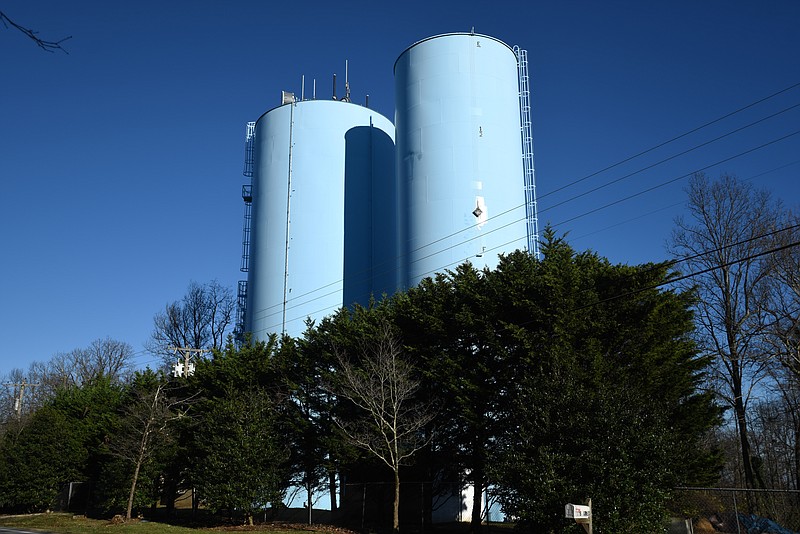The University of Tennessee's Municipal Technical Advisory Service is recommending that the town of Signal Mountain raise rates for customers of its municipal water system by about 15 percent now and for the next two years, a cumulative 52 percent increase over three years, followed by moderate annual increases for the foreseeable future.
Brad Harris, a consultant with the independent advisory service, said that although the water system turned a profit of around $20,000 last year, if the town does not raise rates, expenses will soon exceed revenue and the system's cash balance will be entirely depleted by FY2022-23.
The system currently has a cash balance of around $3 million, and the town's goal is to create a rate structure that would allow it to fund capital projects on a cash basis rather than having to finance them and incur interest costs, said Town Manager Boyd Veal.
Upcoming projects for the aging system include purchasing automated meters and related software in 2019-20 at a cost of $660,000, and replacing lines on Dunsinane Road and Tennessee and Georgia avenues in 2020-21 for $499,950 and $354,750, respectively.
Presenting the results of the recent rate study MTAS conducted for the town, representatives offered two new rate options. Either would immediately raise revenues by about 15 percent while simplifying the town's current rate structure.
The last time the town raised its water rates was in 2011, when customers saw a 14.97 percent increase.
Customers now pay $20.19 for up to 4,000 gallons, plus $5.78 per each additional 1,000 gallons; or $60.59 for up to 12,000 gallons, plus $5.78 per each additional 1,000 gallons. Rates for customers outside the town are about 125 percent of those for town residents.
Meter reading and billing for the majority of customers is done quarterly, although it is done monthly for some of the system's larger customers, said Veal.
In the most recent audit, conducted in FY2017-18, there were 3,756 taps in the town, but only about 3,260 are active in any given year. Customers are not currently charged for inactive taps, which are mainly yard meters used for irrigation during certain parts of the year, said MTAS consultant Sharon Rollins.
With Option A, the town would implement a monthly customer service charge this July of $5.94, which would be billed regardless of whether any water was used, although customers would not be charged for inactive taps.
Customers would also pay a usage charge of $5.94 per 1,000 gallons starting in July, and that rate would increase by 15 percent in both July 2020 and July 2021. After that, annual cost-of-living increases would be implemented. MTAS calculated those increases at 4 percent, but that may change as the town evaluates its cash flow and net position over the next three years, Veal said.
Option B - which the advisory service recommends - includes a monthly service charge of $6, which would be billed for all taps, both active and inactive.
The additional usage charge would be $5.80 per 1,000 gallons. As in Option A, that rate would increase by about 15 percent over each of the next two years, with annual cost-of-living increases after that. Rates for customers outside the town would about 120 percent of the rates of customers within the town.
Option B would bring in slightly more revenue - about $1.625 million in FY2020, compared to $1.623 million with Option A.
Rollins said she recommends Option B because of the equity the service charge for inactive taps provides for customers, as well as the value of having water available at those meters.
The council decided to wait until Councilman Bob Spalding, who was not present, could weigh in before taking a vote on a rate increase or whether to keep the town's water system, which both Walden's Ridge Utility District and Tennessee American Water have submitted bids to purchase.
"I'm not opposed to getting to the decision; I just want to have a full council," Councilwoman Amy Speek said, adding that while some council members may feel the majority of citizens want to keep the system, it's still a controversial issue that deserves the input of everyone on the council.
In response to Mayor Dan Landrum's question of whether the council could vote to raise rates before deciding if the town is going to keep or sell the system, Veal pointed out that the new rates in at least one of the purchase proposals are based on where the town's rate is set at the time the acquisition happens.
If Spalding is present at the March 25 council meeting and the council decides to move forward with the rate increase or the sale of the water system, staff would need to draft an ordinance. The first opportunity to take a vote would be at the April 8 meeting, and the ordinance would need two votes to pass.
Email Emily Crisman at ecrisman@timesfreepress.com.
